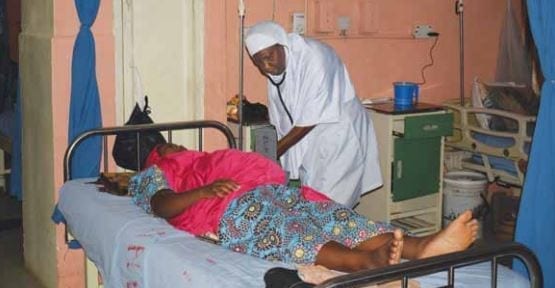A new survey of 700 health workers in six West African countries—Gambia, Ghana, Nigeria, Senegal, Sierra Leone and Togo—provides a window into health-sector shortcomings that are compounding the region’s ability to respond effectively to the COVID-19 crisis. The survey, conducted by the Organization of Trade Unions of West Africa (OTUWA) together with national trade union centers and healthcare unions, was released last week together with a raft of union recommendations for ensuring the protection of health care worker rights and effective, accessible health care for all.
“The results of OTUWA’s health care worker survey are very important for the decision-makers in this region, especially in the midst of a pandemic,” said OTUWA President and National Union of Autonomous Trade Unions of Senegal (UNSAS) General Secretary Mademba Sock.
The survey found that most health workers are being subjected to increased workload without additional compensation and feel unsafe at work due to shortages of personal protective equipment and inadequate access to COVID-19 tests. Respondents indicated insufficient health facilities, shortage of medical personnel and unaffordable medical care as their most pressing issues.
OTUWA, which represents trade union national centers in the 15 West African countries comprising the Economic Community of West African States (ECOWAS), will promote the survey’s findings and policy recommendations within regional organizations such as ECOWAS and the West African Health Organization (WAHO). OTUWA will also support affiliates as they engage their own governments on issues that negatively affect health care workers and prevent universal access to good health care.
“The survey findings underscore the fact that workers and unions must be involved in all discussions and decisions about health care systems in our region, so they properly serve everyone’s needs,” said OTUWA Secretary General John Odah, who is urging governments in the region to prioritize and increase budgetary spending on health facilities and supplies.
The survey report was released during an OTUWA-led virtual presentation on October 8, during which Kwasi Adu-Amankwah, International Trade Union Confederation (ITUC)-Africa general secretary, and David Dorkenoo, International Labor Organization (ILO) Bureau for Workers Activities (ACTRAV) specialist for Ghana, Liberia and Sierra Leone, underlined the survey’s importance for policymakers. Other participating organizations in the event included the Organization of African Trade Union Unity (OATUU); Benin, Gambia, Ghana, Mali, Nigeria and Senegal national union centers; and several health care unions.
“We are brothers and sisters across these countries, and we have learned a lot from the pandemic,” said West Africa Health Sector Unions’ Network (WAHSUN) Chair Perpetual Ofori-Ampofo, during the event.
At Ofori-Ampofo’s suggestion, event participants agreed that union representatives discussing health care issues with their governments should emphasize the urgency of ratifying International Labor Organization (ILO) Convention 190. C190 is the world’s first treaty requiring governments to address gender-based violence and harassment in the world of work, which Ofori-Ampofo said is commonly reported by health workers in the region.
The survey is an activity of OTUWA’s new “Healthcare Is a Human Right” campaign. Launched in Abuja in March, the campaign unites OTUWA affiliates in a fight for equal and fair health care access for all who live within the ECOWAS region.
The survey report is also available in French.

